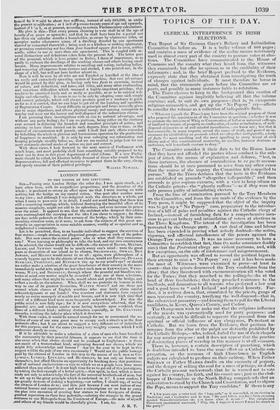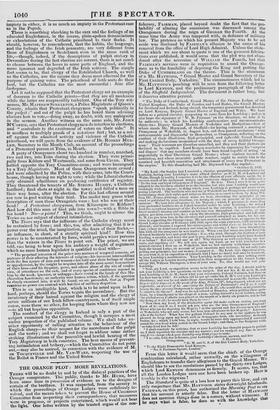TOPICS OF THE DAY.
CLERICAL INTERFERENCE IN IRISH ELECTIONS.
THE Report of Sir GEORGE GREY'S Bribery and Intimidation Committee lies before us. It is a bulky volume of 800 pages ; and contains a mass of evidence of the undue means notoriously used in almost every part of the country to procure votes at elec- tions. The Committee have communicated to the House of Commons and the country what they heard from the witnesses they examined; but offer no opinion as to the credibility of their informants ; and, in the brief Report prefixed to the Evidence, expressly state that they abstained from investigating the truth of charges against individuals. It must therefore be borne in mind, that the statements given before the Committee are ex pane, and possibly in many instances liable to refutation. The Times chooses to keep in the background this caution of the Committee against implicitly believing all that the volume contains; and, to suit its own purposes—that is, to exasperate religious animosities, and get up the " No Popery" cry—affects to consider the volume as a collection of indisputable facts.
" Whatever (quotb the rims) may have been the in iginal purpose of those who proposed the appointment of the Committee in question,—whether it was to promote the interests of Whig or Conservative, of ballot or universal suffrage, of landlord or tenant, of property or confiscation, of order or turbulence, of well- disposed visionaries or of evil-minded incendiaries,—we know not ; but that it has essentially, in many respects, served the cause of truth, and proved an in- strument fur establishing on grounds which are altogether indisputable, a body or filets tin most revolting and the most appalling to every friend of civil liberty and of this constitutional monarchy, no caviller, however dextrous or audacious, will henceforth venture to deny."
The Committee consider it their duty to let the House know that they have not afforded the parties whose conduct is the sub- ject of attack the means of explanation and defence, "lest, in those instances, the absence of contradiction to ex pane accusa- tions should be at once presumed to arise from any other cause than the course of the inquiry the Committee felt compelled to pursue." . But the Times declares that the facts in the Evidence are established on grounds "altogether indisputable;" and then proceeds to give copious extracts, with a view to heap odium on the Catholic priests—the "ghostly ruffians"—as if they were the only persons guilty of intimidating electors. From the line of examination pursued by the Tory Members on the Committee, and from the use made of the evidence by the Tory press, it might be supposed that the object of the inquiry was to get up a" No Popery case, preparatory to the introduc- tion of a bill of pains and penalties against the Catholic clergy of Ireland,—instead of furnishing data for a comprehensive mea- sure to prevent bribery and intimidation of voters at elections in the Three Kingdoms. The intent of the investigation has been :Perverted by the Orange party. A vast deal of time anti labour has been expended in proving what nobody doubted—the active, vigorous, and effectual interference of the priests against the Orange-Tory candidates. It was no more 'necessary to have a Committee to establish that fact, than (to make assurance doubly sure) that the Protestant clergy are violent partisans, and, with few exceptions, on the side of intolerance and misgovernment. But an opportunity was offered to second the political bigots in their attempt to raise a "No Popery" cry ; and it has been made the most of. Witnesses were examined to prove—at least to assert—that the priests denounced the Tory candidates from the altar; that they threatened with excommunication all who voted for the Tories; that they marched to the polling-boeths at the head of their freeholders; that they preached resistance to the landlords, and damnation to all tenants who preferred a low rent and a good lease to " ould Ireland" and political honesty. Fur- ther, it is written down, that, stimulated by- the priests, gangs of men traversed the country, terrifying the well-disposed—that is, the subservient peasantry—and forcing them to poll for the Liberal candidates, in Kerry, Queen's County, and Carlow. The Orangemen wish to make out that the religious influence of the priests was systematically used for party purposes : and
certainly, it would be difficult to separate the personal from the spiritual or official influence of any clergyman, Protestant or Catholic. But we learn front the Evidence, that partisan ha- rangues from the altar or the pulpit are distinctly prohibited by
the Catholic Bishops,—who, indeed, forbid the use of their chapels for any secular purpose : and it does not appear that the practice
of desecriaing places of worship in this manner is at all common. There is, however, a certain description of preaching, which is doubtless intended to have the same efrcet on a Catholic con- gregation, as the sermons of high Churchmen in English
pulpits are calculated to prcduce on their auditory. When Father SHEHAN or Father MAnert dwells on the enormity of perjury,
and the danger of selling the soul for a mess of pottage, no doubt the Catholic peasant understands that he is warned not to vote against his country, his faith, and his conscience ; just as the clod- hopper of Devonshire or the North Riding comprehends that an exhortation to stand by the Church and Constitution, and to abjure the Pope, means to support the Tory candidate.* If there is any
• A Ii-w years ago, a voter took the "long oath," as it was called, at an election in York,hire; and it bystander said to him, My gum' fellow, you ha'.' been sntaring agahnt Transubstantiation—do you know u hat it mums ?" The enlightened Protestant constituent answered, " Why, Sir, I sumose it means I must be stanch to the party I"
impiety in either, it is as much an impiety in the Protestant case as in the Popish. There is something shocking to the ears and the feelings of an educated Englishman, in the coarse, plain-spoken denunciations or exhortations of the Catholic priesthood to their flocks. It should, however, be remembered, that the habits, the language, and the feelings of the Irish peasantry, are very different from those of Englishmen or Scotchmen even in the same rank of lite,—though, indeed, if the descriptions of pulpit oratory in Devonshire during the last election are correct, there is not much
to choose se between the boors in some parts of England, and the more ignorant and degraded of the Irish cottiers. The simple
fact seems to be, that clergy of the Established Church, as well as the Catholics, use the means they deem most effectual for the
purpose of gaining votes. The priesthood of both sects do their best, hut the Catholics are the most successful : hinc ince lachrymee.
Let it not be supposed that the Protestant clergy set an example of decorum to the Catholic priests—that they are all meekness
while the latter are irrepressibly turbulent. One of the Tory wit- nesses, Mr. MATTHEW SINGLETON, a Police Magistrate of Queen's County, admits that Protestant clergymen "speak politically in
the pulpit;" and out of the pulpit he has heard them advising electors how to vote,—doing away, no doubt, with any ambiguity m the sermon. Another witness on the same side, Mr. Jour/
MCARTIE, says that Protestant clergymen do interfere in elections,
and " contribute to the excitement of voters on their side." It is needless to multiply proofs of a notorious fact ; but, as a set- off against the admitted activity and violence of the Catholic
priesthood, we will quote from the evidence of Dr. ROBERT MUL- LEN, Secretary to the Meath Club, an account of the proceedings of a Protestant parson at Trim, in Meath.
A party of Orangemen about two hundred in number, marched, two and two, into Trim during the election. They were princi- pally from Kildare and Westmeath, and some from Cavan. They halted opposite the Tory Committee-room ; and were harangued by a Tory Magistrate. Most of these Orangemen were armed; and were admitted by the Police, with their arms, into the Court- house, though having no right to vote; while the Liberal electors only obtained admittance on producing certificates of registry. They threatened the tenants of Mr. STRONG HUSSEY, a Catholic landlord ; fired shots at night in the town ; and killed a man on their way home, after the election. For this last offence several are now in gaol waiting their trial. The reader may guess what description of men these Orangeists were : but who was at their head? A Protestant clergyman, from Kilineague in Kildare! And how did this man of God ride into town?—with a Bible in his hand ? No—a pistol ! This, we think, ought to silence the Tories on toe subject of clerical intimidation. The Times says that the influence of the Catholic clergy must be restrained by force ; and this, too, after admitting that it is a power over the mind, the imagination, the fears of their flocks,— an influence, in short, of a strictly spiritual kind ! How this power is to be counteracted by force, would perplex wiser persons than the writers in the Times to point out. The priest, we are told, can bring to bear upon his auditory a weight of argument which no mere human legislator is qualified to deal with- " The perpetual intrusion of the priest into matters of temporal concern, on pretence of their affecting the interests of religion—his incessant intermeddling with the free agency of men and women—his hold over their feelings of shame or apprehension, by the insight he acquires into all the most secret transactions of their lives—and his frequent, gross, and odious abuse of the rite of confes- sion, of attendance on the sick, and of every species of confidence reposed in him by the weak, ignorant, or unhappy—have vested in the hands of this Ma- chiavelian functionary, an authority Over human action, which, if the question be closely examined into, it will be found, we arc. persuaded, that Popish countries no power can contend with but that of military despotism. This is an intelligible hint, which is to be acted upon in Ire- land, perhaps, should the Tories regain the ascendancy. But the inveteracy of' their hatred against the religion and the clergy of seven millions of our Irish fellow-countrymen, is of itself ample cause, were there no other, for keeping them where they now are —in all but hopeless opposition. The conduct of the clergy in Ireland is only a part of the subject examined by the Committee, though it occupies a most . undue proportion of the published volume. We shall take an- other opportunity of calling attention to the behaviour of the English clergy—to their respect for the sacredness of the pulpit and the vestry ; and we shall not forget to adduce some rather striking illustrations of the peaceable and lawful bearing of the Tory Magistracy in both countries. The best means of prevent- ing intimidation and bribery,—which the Committee do not point out,—may also be noticed, in connexion with the evidence of M. DE TOCQUEYILLE and Mr. VAN-WART, respecting the USC of the Ballot in France and the United States.



























 Previous page
Previous page